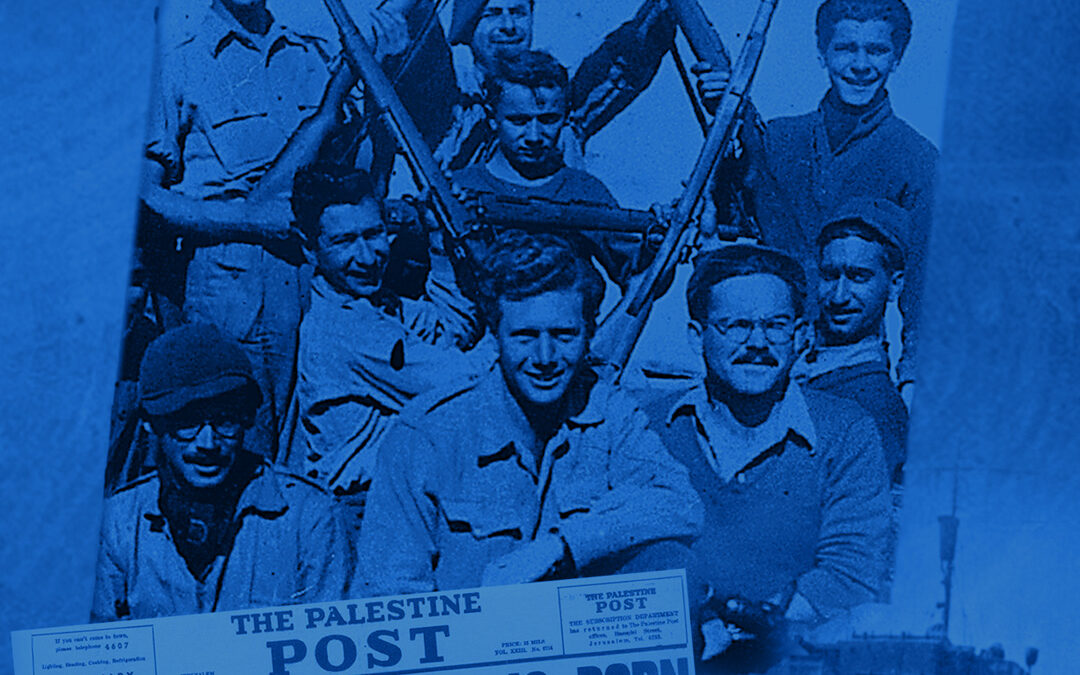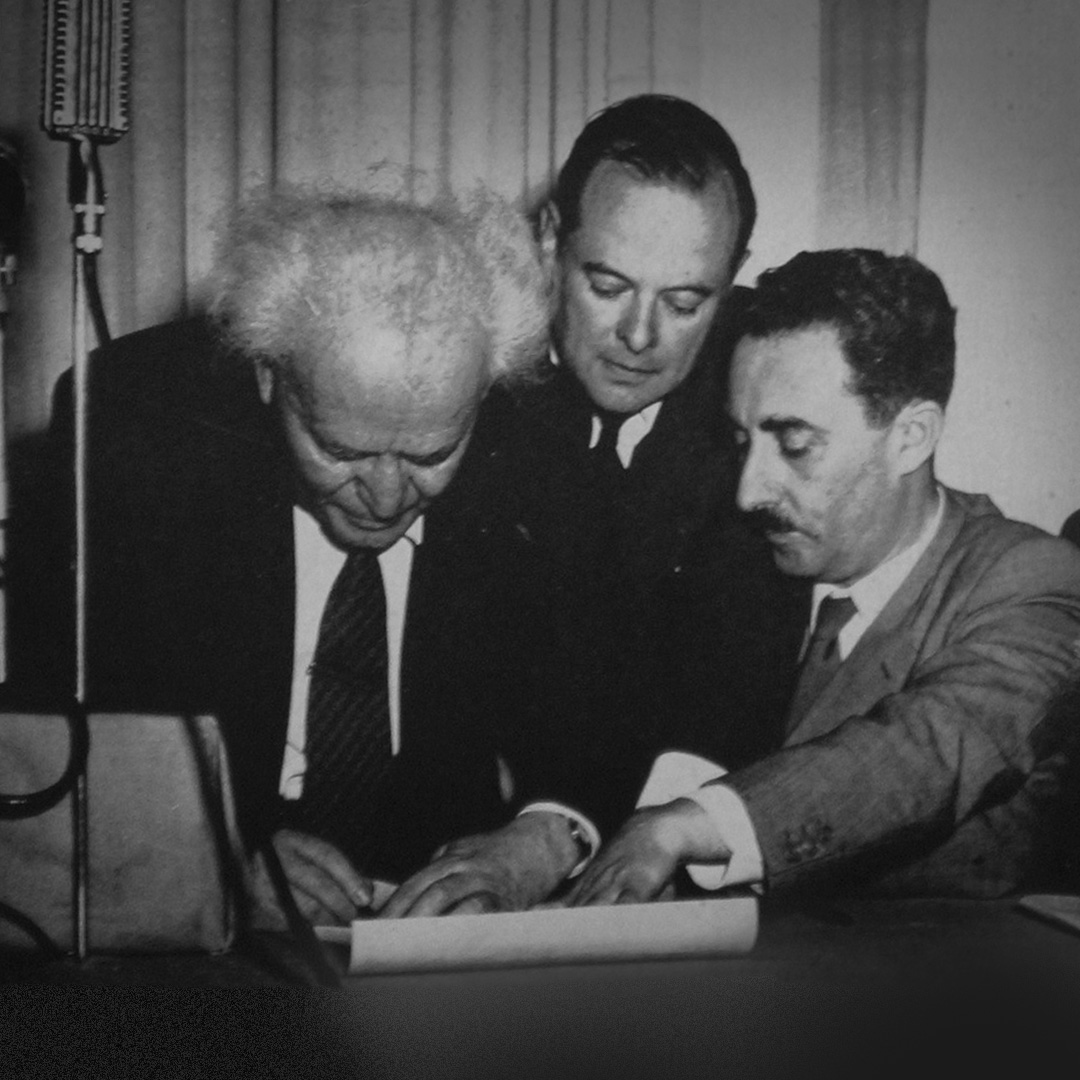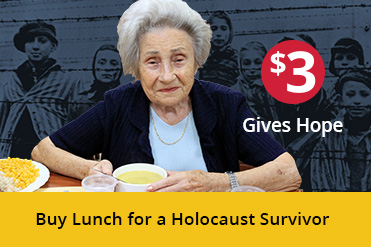Israel’s quest for independence was greatly aided by the Machal or Mitnadvei ChutzLa’Arets (Volunteers from Outside Israel). This was a group of volunteers, approximately 3,500 strong, who hailed from at least 37 different countries. Young and old, they answered the rallying cry of the young nation surrounded by enemies determined to destroy every man, woman, and child. Some of them were Jewish, many were Believers, and some were simply interested in the cause of freedom for Israel.
The Jewish Underground in European countries and other far-flung places during the war produced a number of volunteers eager to aid the Israelis in their quest for autonomy in their new homeland. World War II veterans joined with the newborn Israel Defense Forces, who linked arms to enable ships loaded with Holocaust survivors to avoid blockades set up by the British navy. The proficiency and experience brought by these men and women made a critical difference in getting as many survivors as possible to the Holy Land.
They also made a huge contribution to the outcome of Israel’s War for Independence. The training provided in every area—infantry, air force, navy, artillery, health, and communication—was a key to Israel’s success against an overwhelming foe. This war was truly of a tiny Jewish David versus the Arab Goliath. In its infancy, Israel was forced to fight for its life against the monolithic machine stationed at its borders, and it needed the help of every able-bodied volunteer. Israeli soldiers referred to the volunteers from outside Israel—Americans and Canadians— as the Machlaniks. The enlistees saw firsthand the devastation to the Jews who had taken the burden of fatalities from the enemy armies of five surrounding countries. Relative to the number of inhabitants, Israel’s losses during the War of Independence were “five times higher than the number of American combat deaths in World War II.”
Some estimate the death toll at 6,000—approximately one-tenth of the Jewish population at that time. By contrast, America lost approximately three-tenths of a percent of her population during World War II. The volunteers arrived with drive and determination and with an undeterred dedication to defend the newly created Jewish homeland. Some fought with the Haganah, the underground army, with Palmach, an elite division of the underground, and ultimately with the Israel Defense Forces, but each put their life on the line to assist the Jewish people.
“The Machal forces were the Diaspora’s most important contribution to the survival of the State of Israel.”
– David Ben-Gurion, first Prime Minister of Israel
After the battles had been fought and independence won, many of the Machal stayed on to marry, raise families, and become productive and resolute citizens of the State of Israel. Sons and daughters followed in their footsteps as members of the IDF, defending their nation.
American Jews who wanted to serve were discouraged from doing so. At that time, Israel had few friends, including the United States. An embargo was in place to prevent military materiel being shipped to the fledgling nation. Americans traveling abroad had their passports stamped with: “This passport is not valid for travel to or in any foreign state for the purpose of entering or serving in the armed forces of such a state.”
Those Americans who did attempt to fight alongside the Israelis faced an attempt to intimidate with the threat of losing their citizenship. Americans who chose to ignore the warning had their citizenship put on hold while they served. If taken hostage by the Arab enemies, U.S. servicemen could expect no assistance from the United States and could claim no rights as American citizens. Few other countries placed such harsh restrictions on volunteers who aided the Israelis.
These determined volunteers were forced to travel a complex route to get to the Holy Land. The first leg of the journey was made by ship or airplane to either France or Italy. Once in Europe they were forced to spend weeks or months in camps for displaced persons until passage could be arranged to Haifa. The last leg of the journey was often made on an outdated tramp steamer or ship refitted to carry cargo with the most primitive of facilities. The travelers were in constant danger—either because of the rusting hulks or the Arab enemy.
Among the many who gave selfless assistance to the Israeli army and air force were: David Daniel “Mickey” Marcus, a graduate of West Point and later Commissioner of Corrections for New York City, who according to the Jewish Virtual Library: “wrote the first Israeli field manual on tactics and tragically died during the fight to open a new road to Jerusalem when he was accidentally shot by an Israeli sentry.” Marcus was later immortalized by Hollywood in the movie “Cast a Giant Shadow.”
Paul Shulman, an Annapolis alumnus, commanded the Israeli navy. His fleet numbered just three ships. Harry “Freddy” Fredkens was returned to England by David Ben-Gurion to clandestinely purchase aircraft for the newly christened Israeli Air Force. He was able to secure several trainers as well as Norseman light transport planes. Jack Freedman, a British citizen, was an excellent airplane mechanic and flight engineer. He was tapped to use his expertise to prepare the older-model planes for flight. It was Freedman who cobbled together Israel’s first Spitfire. It was assembled from parts of abandoned Royal Air Force planes following the British withdrawal from Palestine. The plane was test flown by Boris Senior of South Africa, a World War II pilot who also volunteered his services to fly airplanes to Israel from their purchase sites.
In America, Al Schwimmer, a TWA flight engineer, left his job to act as purchasing agent to secure much-needed airplanes. He helped to organize the Israeli Air Force’s Air Transport Command (ATC), the group that flew aircraft from Czechoslovakia to Israel, a major accomplishment. It was IAF pilots who were able to halt the Egyptian army’s momentum toward Tel Aviv.
Major General Herzle Bodinger, commander of the IAF from 1992 to 1996, said of the Machal airmen who flew so bravely into the battle during the War of Independence: “The non-Israeli aircrews played a decisive role, both in achieving Air Force objectives and in laying its organizational foundation. The legacy of their special contribution accompanies us to this day.”
During the course of the conflict, at least 119 Machal volunteers died in battle; four were women, and seven were Gentiles from the United States and Canada: George “Buzz” Beurling, Leonard Fitchett, Fred Stevenson, Glenn King, Bill Edmondson, Spencer Boyd, and Oliver G. Holton. All fought bravely for the right of the Jewish people to return to their homeland in Palestine. The outcome might have been terribly different had it not been for an illicit infusion of military supplies, including machine guns, rifles, and ammunition from (what was then the united country of) Czechoslovakia near the end of May 1948. It was a blessing for the under-armed Israelis and a monetary boon for the cash-strapped Czechs.
By the time the long, bitter battle finally ceased in January 1949, Palestinians by the hundreds of thousands fled to surrounding countries upon orders from the Arab leaders, who had visions of a triumphant return after routing the Jews. Following the deadly confrontation, Israeli leaders made the first of many succeeding attempts to forge a lasting peace with their Arab neighbors; no one would respond. There was no partner for peace. Arab inflexibility alone was responsible—then and now—for the continuing wars and unrest.
There is no doubt in the mind of any Jewish national who participated in the War for Independence that it was in large measure the various gifts, skills, experience, and passion of these brave and loyal volunteers from around the globe that brought them victory and sustained the fledgling State of Israel.
Lydia Christensen was a child of privilege. Born in Denmark in 1890 to wealthy parents, she achieved most of her life’s goals by the time she was 38. She became a teacher and pioneer in the field of home economics. She also enjoyed a loving relationship with Soren, another teacher, and was certain they were destined for marriage. Yet something was missing. Lydia later recalled: “There was a finality about it [marriage] that frightened me. Why should I have to fight that private reservation? Was there still something that was needed to make our lives complete? During the past year I had turned this question over in my mind a hundred times, but I had never been able to find any answer. Indeed, I had no idea where to look for one.”
Putting the question to Soren was perhaps the best thing Lydia could have done. He remarked that the emptiness inside her could be filled with religion and suggested she visit the Evangelical Mission nearby. Rather than take Soren’s suggestion, Lydia boarded the train the next morning to join her mother and siblings for the Christmas holidays. Though she had a wonderful visit, the inner turmoil continued to plague her even after she returned to her empty apartment in Korsor.
Sitting in her living room one cold afternoon, she opened her Bible to the book of Matthew. She read through the first six chapters but discovered that: “as I reached chapter 7, it was as though I came to a clearing, where the full, uninterrupted rays of the sun came streaming down upon me…. Somewhere ahead … there was a gate. Inside, there was a way that led to peace and fulfillment.”
During Bible study that fateful day, Lydia met the Prince of Peace and submitted her will and her life to the Lord Jesus Christ. After much prayer and seeking God’s will, Lydia felt that He was directing her to go to Jerusalem during the tumultuous days between the First and Second World Wars. On October 18, 1928, at the age of 38, Lydia landed in Tel Aviv with about $200 in her purse and then traveled eastward to Jerusalem.
There, she learned Arabic and founded a children’s home, becoming a mother to dozens of Jewish and Arab orphans, mainly girls. Lydia quietly ministered to Arab women in Jerusalem. When World War II broke out, she expanded her ministry to include British soldiers stationed in or visiting Jerusalem during the conflict.
One of the soldiers with whom Lydia came in contact was Derek Prince, a scholar of both philosophy and language. Though there was a 25- year age gap between the two (Lydia was the elder), they married and remained in Israel until its declaration of independence in 1948. After their marriage, she and Derek adopted eight of Lydia’s orphan girls. The Princes and their daughters returned to Britain, where they taught, ministered, and shepherded gatherings. Their service to various congregations took them to England, Canada, Africa, and finally to the United States, where they settled in Fort Lauderdale, Florida.
Derek Prince became a well-known Bible teacher with a successful radio ministry. His program, “Keys to Successful Living,” was heard in various languages worldwide. He was equally well-known for his service in the Full Gospel Businessmen’s Fellowship International. Lydia was his helpmate in every way, working diligently in the ministry to help promote the Gospel. She suffered a debilitating stroke in 1975 and died in October of that year. Not only her family grieved her death, but people worldwide mourned the loss of the woman who had touched their lives over a span of 50 years—particularly those in Israel.
Just as the Machal responded to the desperate need of the nation of Israel in 1948, today we are faced with the challenge—and the opportunity— to take a stand for God’s Chosen People. The members of the Jerusalem Prayer Team are fighting a conflict that is just as real, even though by its nature a spiritual battle cannot be seen with our natural eyes.
Our prayers are a vital weapon in the struggle for control of the Holy City and the land of Israel. We must be faithful and diligent as we do our part to defend the Jewish people in our day.
Show Your Support By Giving Now







